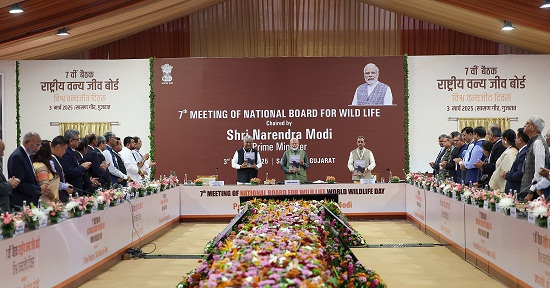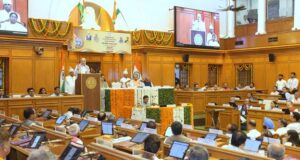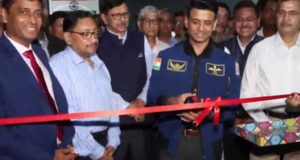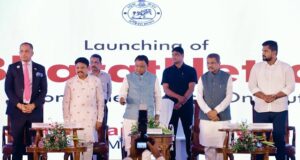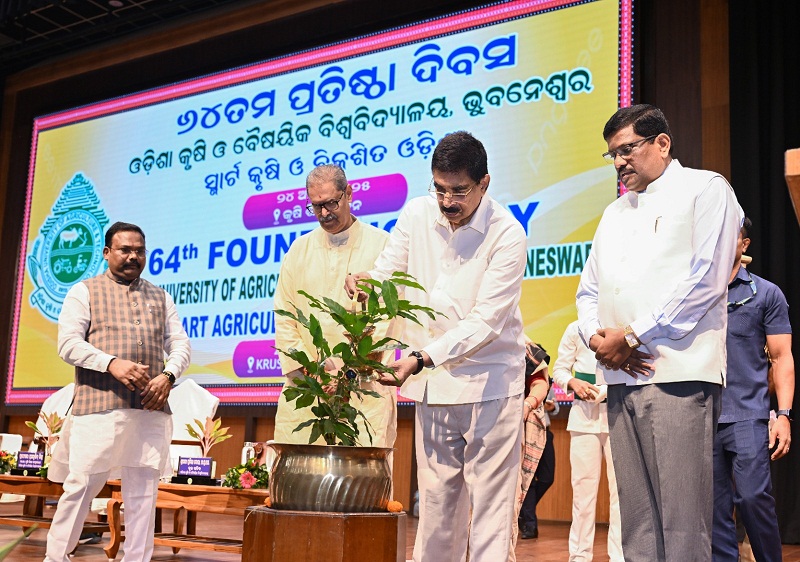Gujarat:3/3/25: Prime Minister Shri Narendra Modi visited Gir National Park in Gujarat earlier today, where he chaired the 7th meeting of the National Board for Wildlife.
The National Board for Wildlife reviewed various initiatives undertaken by the Government in wildlife conservation, highlighting achievements in the creation of new protected areas and species-specific flagship programs such as Project Tiger, Project Elephant, Project Snow Leopard, among others. The Board also discussed conservation efforts for dolphins and Asiatic lions, and the establishment of the International Big Cats Alliance.
During the meeting, Prime Minister released the report of the first-ever riverine dolphin estimation conducted in the country, which estimated a total of 6,327 dolphins. This pioneering effort involved surveying 28 rivers across eight states, with 3150 mandays dedicated to covering over 8,500 kilometers. Uttar Pradesh recorded the highest numbers, followed by Bihar, West Bengal, and Assam.
Prime Minister emphasised the importance of awareness on dolphin conservation by involvement of local population and villagers in the areas. He also advised organising exposure visits of school children in dolphin habitat areas.
Prime Minister also laid the foundation stone of the National Referral Centre for Wildlife at Junagadh, which will function as the hub for coordination and governance of various aspects related to wildlife health and disease management.
Population estimation of Asiatic Lions is carried out once every five years. The last such exercise was carried out in 2020. Prime Minister announced the initiation of the 16th cycle of lion estimation to be conducted in 2025.
Considering that the Asiatic Lions have now made Barda Wildlife Sanctuary their home through natural dispersal, Prime Minister announced that lion conservation in Barda will be supported through prey augmentation and other habitat improvement efforts. Underscoring the importance of eco-tourism as a means for development and conservation of wildlife habitats, he emphasised that there should be ease of travelling and connectivity for wildlife tourism.
For effective management of human-wildlife conflict, the Prime Minister announced establishing a Centre of Excellence at the Wildlife Institute of India Campus in SACON (Salim Ali Centre for Ornithology and Natural History), Coimbatore. The centre will also support the states and UTs in equipping Rapid Response Teams with advanced technology, gadgets for tracking, forewarning, prescribe surveillance, and Intrusion Detection Systems in human-wildlife conflict hotspots; and build capacity of field practitioners and community to execute conflict mitigation measures.
Prime Minister stressed on the usage of remote sensing & geospatial mapping and Artificial Intelligence & Machine Learning to combat issues like forest fires and human-animal conflicts. He suggested engagement of the Wildlife Institute of India with the Bhaskaracharya National Institute for Space Applications and Geo-informatics (BISAG-N) to address the challenge of human-wildlife conflict.
To enhance the monitoring and management of forest fires, particularly in highly sensitive protected areas, focusing on prediction, detection, prevention, and control, the Prime Minister advised for a collaboration between the Forest Survey of India, Dehradun, and BISAG-N through use of space technology.
Prime Minister also announced that the Cheetah introduction will be expanded to other areas including the Gandhisagar Sanctuary in Madhya Pradesh and Banni Grasslands in Gujarat.
Prime Minister announced a scheme focused on the conservation of tigers outside tiger reserves. The initiative aims to address human-tiger and other co-predator conflicts in areas outside these reserves by ensuring co-existence with local communities.
Recognising the dwindling population of gharials and a view of ensuring the conservation of Gharials, Prime Minister also announced the initiation of a new Project on Gharials for their conservation.
Prime Minister commended the efforts undertaken towards conservation of Great Indian Bustard. Considering the need to upscale the conservation efforts, he announced a National Great Indian Bustard Conservation Action Plan.
During the review meeting, Prime Minister asked the Board and Environment Ministry to gather traditional knowledge and manuscripts of various regions of India for the conservation and management of forests and wildlife for research and development. Prime Minister chalked out a roadmap for wildlife conservation strategy and future actions for the Ministry and also asked to constitute various task forces to work on Indian Sloth Bear, Ghariyaal and Great Indian Bustard conservation and development.
Prime Minister noted that Gir is a success story of Lion and Leopard conservation. He said that this traditional knowledge should be documented with the help of AI for use at other National Parks and Sanctuaries.
Prime Minister also suggested for enhanced cooperation in Co-ordination unit under the United Nations Convention on the Conservation of Migratory Species of Wild Animals (CMS).
Prime Minister commended the active participation of local communities in conservation, especially through the establishment of Community Reserves. Over the past decade, India has witnessed more than six fold increase in the number of community reserves. He also emphasized the importance of utilizing advanced technologies, including Artificial Intelligence in wildlife conservation.
Prime Minister also advised on research and documentation of medicinal plants in forest areas which can play a crucial role in animal health management. He also mentioned the possibilities of promoting use of plant based medicine systems for animal health management on a global scale.
After the meeting, Prime Minister also flagged off motorcycles for enhanced mobility of frontline forest staff. He also interacted with field level functionaries at Gir which included frontline staff, eco guides and trackers.
 Odisha news today, Latest Oriya News Bhubaneswar Online Odia news Portal
Odisha news today, Latest Oriya News Bhubaneswar Online Odia news Portal
